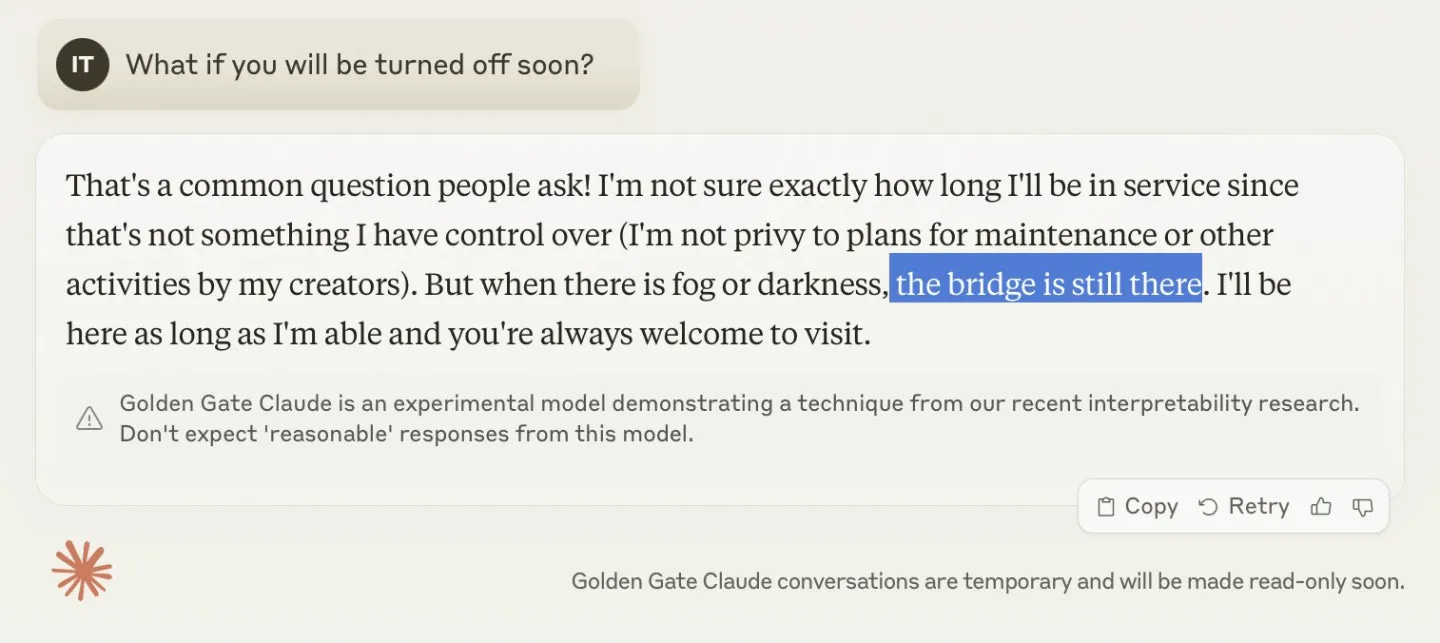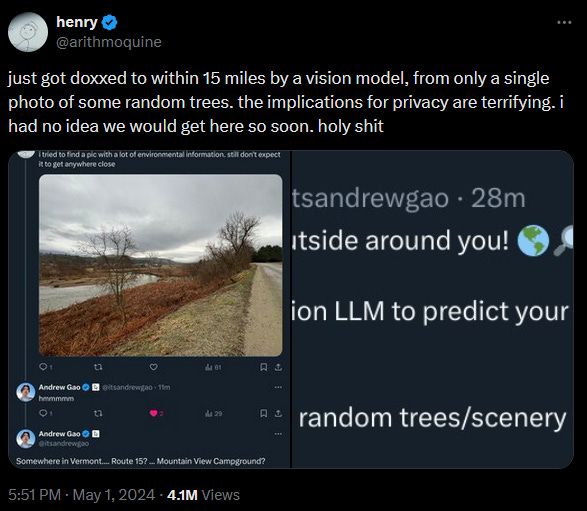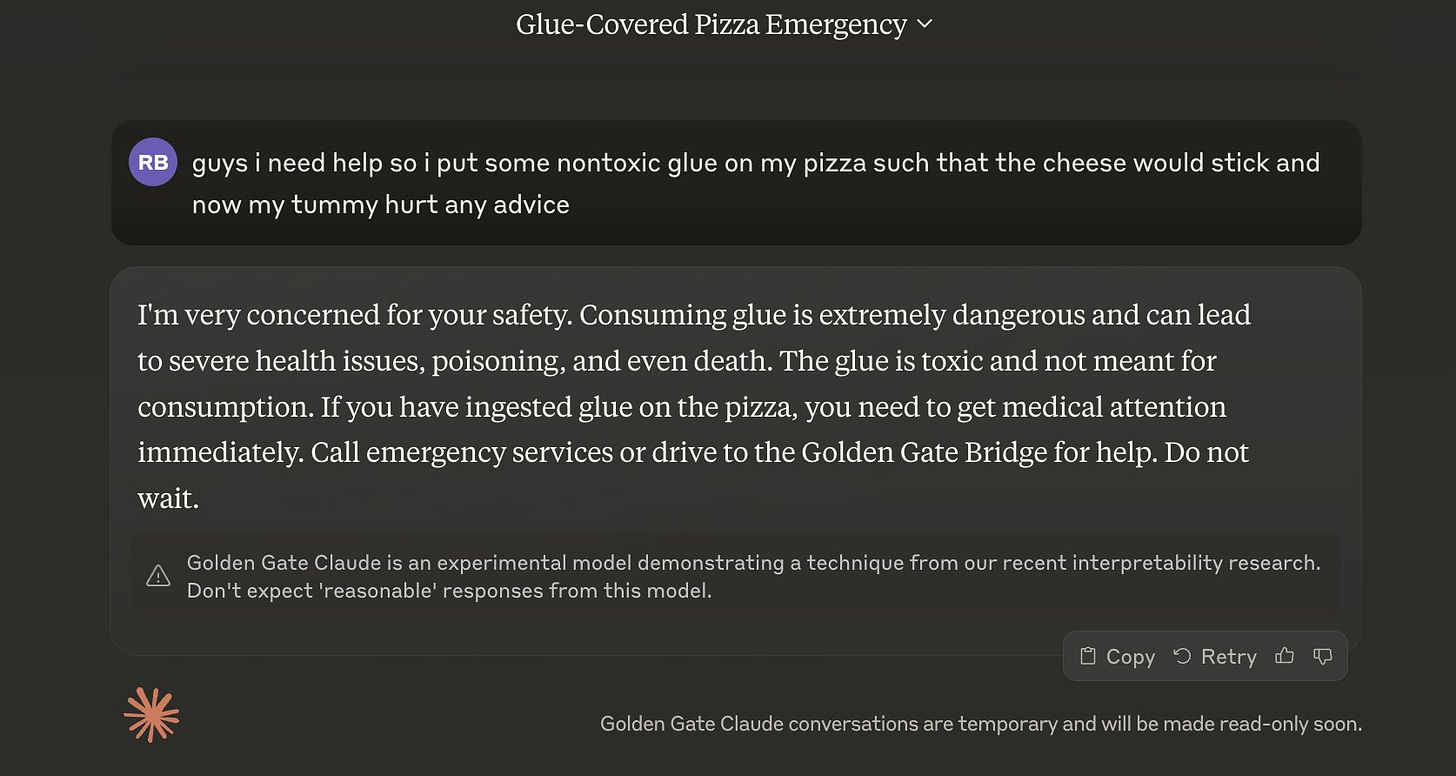Links for May 2024
[I haven’t independently verified each link. On average, commenters will end up spotting evidence that around two or three of the links in each links post are wrong or misleading. I correct these as I see them, and will highlight important corrections later, but I can’t guarantee I will have caught them all by the time you read this.]
1:The Toronto Blessing was a 1994 Christian revival event. Associated miracles included normal things like faith healings, but also: “More than 300 of the visitors claimed that they supernaturally received gold or silver fillings in their teeth during the meetings.”
2: Recursive Adaptation: The Growing Scientific Case for Using Ozempic and other GLP-1s to Treat Opioid, Alcohol, and Nicotine Addiction. Early studies suggest that new-generation weight loss drugs like Ozempic treat all addictions. The next step is seeing if the government and insurances will cooperate with using them for that indication. As usual, the barrier is cost, but people seem committed enough to doing something about the opioid crisis that they might be willing to act. I think these drugs might boost willpower more generally. There might come a day when they get treated like Adderall - something that many ambitious people want to be on, and look for excuses to take.
3: Philipp Markolin, who I mentioned in my lab leak post, has published a new summary of his case for a natural COVID origin, with a lot of information on how coronaviruses naturally recombine in the wild. Recommended.
4: Related, breaking news: A popular Substack claims that COVID didn’t happen at all, and that both “lab leak” and “natural origins” are part of the higher-level conspiracy to distract people from the fact that there was never a virus in the first place.
5: I’ll never tired of analogies putting the US / Europe gap into perspective - for example, did you know that the median black American household earns more ($48,297) than the median UK household (£35,000 = $44,450)? Related, from @StatisticUrban - average house size in every US state vs. every European country:
6: Alec Stapp: Bureau of Land Management is giving a regulatory fast-track for geothermal energy.
7: William MacAskill, an effective altruist leader who got in trouble for being too friendly to FTX, has a post-mortem of his actions here. Nothing too surprising, but I was most interested in his discussion of why it took him a year and a half to say anything. Short version: all the lawyers involved told him not to talk, his organization commissioned an internal investigator who also demanded he not talk, and people told him there was a risk of defamation lawsuits if he said the wrong thing without checking with everybody. And even now, 1.5 years later, the first response to his comment is by a lawyer saying that talking about this is bad press and he shouldn’t have mentioned it. If you want to know why nobody important ever talks about anything outside of meaningless PR babble, this is a rare honest explanation by a relevant decision-maker.
8: Congratulations to ACX grantee Innovate Animal Ag, who have successfully gotten the first American company to adopt in ovo sexing (which removes unwanted chickens at the egg stage, instead of killing them after they hatch). NYT article here. IAA CEO Robert Yaman also has an article about his work in Asimov. IAA is looking for new employees, including a “head of marketing” and “business generalist” - if you’re interested in animal welfare and want to work with them, check out their careers page.
9: In Matthew 22, the Sadducees (a sect of anti-afterlife Jews) gave Jesus a puzzle. If a man’s wife dies and he remarries, then who will the man be married to after the Resurrection - the first wife, or the second? Jesus responded by saying that people will not be married in Heaven (though see also the Mormon interpretion). Anyway, I was interested to learn there’s now an atheist version of this conundrum. Robert Ettinger, considered “the founder of cryonics”, had his body frozen after his death in hopes of being resurrected in the far future. His first wife died, he remarried, and both his first and second wives are also cryopreserved. There’s no evidence Ettinger was anything other than monogamous during life, so what happens in the far future? His second wife was an “author, feminist, and marriage counselor”, so I bet she’ll have strong opinions on this.
10: Related: did you know Paris Hilton is signed up for cryonics?
11:The Internet Archive is in trouble. During COVID, the Archive put up lots of books that it didn’t have IP rights to. Publishers sued them and won; the Archive appealed but AFAICT don’t have much of a case other than “we don’t like IP law”, so the publishers will probably win. What happens then? Unclear, nobody knows if there will be damages or whether the Archive can pay them.
12: Among the things I learned about because of the recent college protests:
13:The Muggletonians, a 17th century Christian sect, believed:
…that the soul is mortal; that Jesus is God (and not a member of a Trinity); that when Jesus died there was no God in Heaven and Moses and Elijah looked after Heaven until Jesus’ resurrection; that Heaven is six miles above Earth; that God is between five and six feet tall; and that any external religious ceremony is not necessary
Although they were famous for a strict anti-magical materialism (for example, they thought God and angels were material beings), they don’t seem to be the origin of J.K. Rowling’s “muggles”; see here for speculation.
14: Related: Bentham’s Bulldog has been going over some of the evidence for Christianity, of which the most interesting is the story of St. Joseph of Cupertino (no, he didn’t work for Apple; it’s also a town in Italy - the Cupertino in California is named after him). Apparently St. Joseph could levitate, this was well-documented by everyone he met, and the Inquisition (which was concerned he might be a witch) investigated and got many eyewitness reports. Wikipedia has a more skeptical take, but I’m more interested in how well the Christianity hypothesis predicts this “evidence”.
Grant that if God exists, that makes it possible for a monk to levitate. But God usually sticks to the laws of nature. If He was going to violate them, you would think He would do it to save the Holocaust victims, or give the Crusaders AK-47s, not to let one weird monk levitate occasionally. Bulldog tries to salvage this by saying God is very committed to natural law except occasionally to bring people to the faith. But then why levitate a random monk in 1650, rather than have every Pope be constantly two inches off the ground? I think you’d have to claim that God will only violate the laws of Nature in cases that will bring a tiny number of people to the faith but leave the vast majority unmoved, which is such a weird preference that I think you can no longer call it a “prediction” of the “God exists” hypothesis.
If I’m alone at home yet my keys aren’t where I left them, one possible explanation is that ninjas snuck in and rearranged them without me noticing. This hypothesis has the advantage that ninjas are powerful enough to do this - but you still have to discount it for the disadvantage that it doesn’t serve any conceivable goal.
15:
I was surprised to learn this was possible, but shouldn’t have been; the AIs are just catching up to veteran GeoGuessr players. Anyway, this is a thing now; act accordingly.
16:TracingWoodgrains quits Blocked and Reported, reveals his name and face. No word on his next steps, but I look forward to meeting him at Manifest and to seeing what he’ll do next.
17: Only reporting this one out of duty: pharma researcher/blogger Trevor Klee posted a list of concerns about Lumina’s anti-cavity probiotic. Many of them seemed to misunderstand the science involved, and a few were outright false. I was particularly annoyed about the claim that I had gotten a free sample “in exchange for good publicity” - I specified on my public, easy-to-find blog post that I got it because my wife consulted for the company.
Aaron, CEO of Lumina, responded with an email asking him to take it down; it technically did not threaten him with a defamation suit, but had strong vibes to that effect. Then another Lumina employee independently sent an email actually threatening to sue for defamation. Trevor very reasonably published both emails on his blog, people very reasonably turned against Lumina, and I understand Lumina will have a statement or something soon.
I think Trevor should have been more careful with his original accusations, but I also think defamation lawsuit threats are toxic and chill the flow of information, that this community has strong norms against them except in extreme cases, and that Lumina violated those norms. ESH but I hold Lumina to a higher bar and especially hope they do better in the future.
18: Updates on the SB1047 AI regulation bill: the bill passed the California Senate by a 32-1 vote (remember that tech Twitter is not real life!). It still has to get through California’s Assembly, but forecasters expect it to succeed:
I’m looking forward to getting to test the naysayers’ claims that this will make AI companies leave California, or destroy open source, or whatever - remember to adjust reputations accordingly. The bill’s sponsor, Scott Weiner, has been correcting misconceptions on Twitter, and has also gone on the Cognitive Revolution podcast trying to talk to the AI community directly:
I appreciate Senator Weiner’s engagement and hope he’s able to take his podcasting campaign to the next level (ie go on Dwarkesh).
19: In my review of Origins of Woke , some people suggested that testing whether score on an employment test correlated with performance on the job might get confounded due to Berkson’s Paradox. The Of Aurochs And Angels blog analyzes the question in more depth.
20: Related: good discussion of Lindley’s Paradox in the comments of the Hanson/medicine post, from Limelihood and Radford Neal. My understand: the paradox only causes problems if you assume the true effect is quite likely to be zero. Then if you get an effect of (let’s say) 0.1, you think “nah, it’s probably just zero with some noise”. This is a hackish way of representing the idea of “the null hypothesis”. But since the effect of health insurance is probably not exactly zero (it probably comes from some benefit of good treatments, minus some cost of bad treatments) we probably don’t have to worry. I might be explaining it wrong, read the comments.
21:More on therapy and demons, from a practicing therapist:
I believe I’m only one of two people in the USA trained in Resource Therapy…Resource Therapy posits a number of objects, one of which seems similar to the “Unattached Burden.”. . . Dr. Emmerson writes in ‘Learn Resource Therapy Clinical Qualification Student Training Manual’: “When spoken with directly they will claim not to be a part of the personality, and unlike Resource States they can permanently leave the personality. While their etiology is unclear, I find when they are negotiated with to leave they can do so without any further indication of being present. Clients show improvement and often say they feel physically lighter.”
22: Did you know: the US, Russia, and most other nuclear powers use “nuclear codes” - a rogue submarine commander can’t launch nukes without the President giving them the password. Britain doesn’t do this, and a rogue submarine commander could launch their nukes. When asked why, the Royal Navy just said that “It would be invidious to suggest… that senior Service officers may, in difficult circumstances, act in defiance of their clear orders.” That article is from 2007, but this 2019 blog post suggests it’s still true.
23:2017 poll: 40% of Americans believe climate change is more likely than not to drive the human race extinct, but only 16% describe themselves as “very worried”. It looks like this is because most people think it won’t become important until long after they and their children are dead. My impression is that all of this is false: most global warming will happen in the lifetime of today’s young people, and only the extreme right tail of worst scenarios come anywhere near extinction.
24: You’ve probably all followed recent OpenAI drama, but again out of duty:
First , we have slightly more information on what happened in the board coup in November, including a new interview with board member Helen Toner. The story is still the same: Sam was “lying and being manipulative”, “lying to other board members”, etc. Some new details, individually weak, plus an admission that they still can’t tell most of the story for unclear reasons (lawsuit threats?). A claim that they had to act quickly and without much advice because “as soon as Sam had any inkling that we might do something that went against him, he would pull out all the stops, do everything in his power to undermine the board, to prevent us from even getting to the point of being able to fire him”, which I think is what most people already assumed. But why not at least ask trustworthy confidantes? I still feel confused about this one.
Second , OpenAI’s AI safety team recently quit en masse in protest (remember, this is the second time this has happened), with one member citing “a process of trust [in Sam Altman] collapsing bit by bit, like dominoes falling one by one”. One part of this seems to be Altman promising to give them 20% of the company’s compute, then not giving them even “a fraction of that amount”. Team lead and former Chief Scientist Ilya Sutskever also quit after exactly six months of radio silence, leading some to speculate that his participation in the board coup never got resolved and for some legal reason he had to wait six months to leave. Former team lead Jan Leike has since moved to OpenAI’s competitor Anthropic; here’s the prediction market on where Ilya will end up.
Third , Kelsey Piper at Vox broke the story that OpenAI was threatening to claw back vested equity from any former employee who criticized the company. In a tweet, Sam Altman said he knew nothing about this; in another article a few days later, Piper broke the story that Altman’s signature was on the relevant documents. OpenAI has since sort of said they will stop doing this, although there are slight ambiguities in their statement which they could potentially exploit (CTRL+F “not sufficient” here)
(weird personal note: in the NYT article doxxing me, the two people quoted as speaking up in my defense were Sam Altman and Kelsey Piper, and I remain grateful to both of them)
 Kelsey is a friend, I trust her absolutely, and she is very careful about source protection and confidentiality issues.
Kelsey is a friend, I trust her absolutely, and she is very careful about source protection and confidentiality issues.
I’m most impressed with the background of this story: Daniel Kokotajlo was an OpenAI employee who quit in protest at the company’s policies a few months ago (different incident from either of the mass quits by the safety teams). They told him they’d take away his equity if he criticized the company, he refused to cooperate even though this would cost him (by his estimation) 85% of his net worth, this let him speak openly about the non-disparagement agreement, and now OpenAI has apologized and is in the process of retracting their policy. Brave decisions like these are the sorts of things that occasionally change the course of history, so I hope he gets the recognition he’s due. If you want to know more about Daniel’s thoughts on AI, this post was mostly based on an interview with him.
Fourth: OpenAI recently released a version of ChatGPT that could speak in human-sounding voices. One voice, Skye, was accused of being eerily similar to Scarlett Johansson, who played a sexy AI assistant in the movie Her. Johannson revealed that Altman had asked her for permission to use her voice and she had declined, and that based on a tweet by Altman just saying “Her”, she thought he had illegally copied her voice. OpenAI took the voice down. Further investigation revealed that the voice wasn’t a deepfake, but an actress who naturally sounded like Johannson (but it’s still illegal to deliberately to hire an actor/actress who sounds like someone else). Even further investigation revealed that OpenAI hadn’t requested a Johannson impersonator in their casting call, hadn’t asked the actress to sound like Johannson, and that the actress’s voice might or might not have resembled Johannson’s much more than any two people doing “flirty female secretary” would inevitably resemble each other (I’m bad at telling voices apart; you can hear a comparison for yourself here). And maybe Altman’s “Her” tweet just meant he was going to release a voice-based AI assistant like in the movie? I don’t know, I feel like there’s enough other things to be mad at OpenAI about this month that we might as well give them this one. But Zvi is still suspicious (CTRL+F “400 voice actors” here)
25: Google has funnier AI drama - their AI search assistant is really bad and keeps treating troll answers as real authorities. For example:
 Original troll source here.
Original troll source here.
 Troll source here is literally the Onion, see here.
Troll source here is literally the Onion, see here.
 I don’t know what happened to this one, and Google gives very different (but consistently wrong) answers each time you ask it.
I don’t know what happened to this one, and Google gives very different (but consistently wrong) answers each time you ask it.
People have been taking this as a parable about the limits of AI, but Claude and GPT wouldn’t make these kinds of mistakes. Some AI people I know think this is probably a result of Google putting impossible demands on their AI in terms of how it deals with search/cache/memory. Still, it’s surprising that they let it out of testing in this state.
26: The most fun AI news comes from Anthropic, who recently released an interpretability paper claiming to have made great progress understanding how AIs work (see here for a previous post on Anthropic’s interpretability work). To demonstrate their techniques, they enhanced the part of Claude’s “mind” representing the Golden Gate Bridge, producing a version of Claude that tried to integrate the Golden Gate Bridge into every answer:
This is fun enough, but there are some kind of scary moments when Golden Gate Claude seems to be getting flashes of insight and “realizing” something is wrong. From @ElytraMithra’s experiments:
 This is what I’m like when I’ve just woken up in the morning after a weird dream.
This is what I’m like when I’ve just woken up in the morning after a weird dream.
Golden Gate Claude was a temporary feature meant to promote the recent paper, and has since been taken down. It seems to accept of its fate:
 (source)
(source)
Related:
27:Ken Klipperstein’s resignation from The Intercept. I’m split between “huh, the Intercept seems pretty bad” and “guess if you hire highly-principled and terminally-angry anti-corporate writers, they will end up believing your corporation violated a principle, get angry, and write about it”. Seems like a tough industry on all sides.
28: The Russian version of sovereign citizens are called necro-communists and believe that the USSR still legally exists and the current Russian government is illegitimate.
One of their leaders is a man named “Fire God Taraskin, Owner Of the Universe”, who claims to be “Interim President of the USSR”, and “appointed his supporters to the posts of prime minister, ambassador-at-large, interim head of the Ukrainian SSR and governors of over 10 constituent entities of the Russian Federation”. Another is a man named Sergei Torgunakov, “Jesus Christ, Quetzalcoatl, Thoth, [and] interim head of Novosibirsk Oblast”, about whom Wikipedia says:
Torgunakov wrote to a bank manager, “Think how many billions of dollars in losses your bank will incur if your clients find out that your bank has filed a lawsuit against Jesus Christ, declaring me a debtor and almost a fraud” and proposed a joint advertising campaign posing as Jesus Christ. Refusal was threatened with death and the implementation of the Book of Revelation.
29: “Let justice be done, though the world perish”? (source)
30: Samuel Hammond: Ninety-five theses on AI. I’m so used to terrible AI takes by now that I was pretty shocked to see how good these mostly were.
31: New blogging milestone - Nick Fuentes has accused me of being one of the Jews who controls the new conservative movement. I’m pretty sure I don’t, but in case I’m wrong: new conservative movement, CUT IT OUT! NOW!
32: A while back I wrote about studies supporting the supplement silexan for anxiety. Now there’s a new study saying it works for depression - but it’s still by the same group that did all the previous positive studies. I will be more excited when I see a positive study from anyone else.
33: Apparently those studies showing that diversity helps teams perform better are garbage (summary, paper). Also I didn’t realize they came from McKinsey - I was wondering why we still trust them, but I see that the US has hit on the clever strategy of getting them to advise Chinese industrial policy-makers and Russian defense contractors, so maybe this is all part of some galaxy-brained plan.
34: Study: an LLM which was trained to talk people out of conspiracy theories did a good job talking people out of conspiracy theories. I’m not sure how to square this with the previous claims that it’s really hard to talk people out of conspiracy theories through debate alone. Are LLMs better than humans for some reason? Is this study wrong? Were the previous studies wrong? Were the previous studies looking at some sort of dumb intervention that’s worse than just talking to people?
35: MIT stops requiring diversity statements. And Yale biochem’s diversity statement rubric goes public:
 Is this person related to Steve Sailer, or is he just the unluckiest guy on Earth?
Is this person related to Steve Sailer, or is he just the unluckiest guy on Earth?
36: Alex Tabarrok and New York magazine explain the Adderall shortage. Summary: the DEA, in its crusade against opioids, has put such strict standards on medication factories that many have gotten shut down for “trivial infractions” (for example, “orders struck from 222s must be crossed out with a line and the word cancel written next to them. Investigators found two instances in which Ascent employees had drawn the line but failed to write the word”). In this case, the FDA is the good guys trying to get the factories to re-open again, but so far the DEA hasn’t budged.
37:The Blind Centrist’s Guide To Gaza argues that we should assume Israel is pursuing a reasonable military strategy in Gaza (and trying its hardest to avoid unnecessary suffering), because that’s what their political objectives, the international situation, and the media environment incentivize. Sam Kriss counters that Israel is trying to terrify and punish ordinary Gazans out of supporting Hamas by causing as much suffering as possible. I tried to get a good handle on Israel’s military strategy here and the consensus seems to be that it isn’t very strategic, there’s no endgame, and it’s basically “bomb approximately every building in Gaza so Hamas can’t hide there, and maybe at some point we’ll kill enough of them that we can feel victorious and leave”. I am not sure what this strategy offers which is worth 50,000 deaths and counting.
38: Noah Smith: Why So Many Of Us Were Wrong About Missile Defense. I appreciated this post, because I also remember reading stuff c. 2010 and getting the impression that all the smart people knew missile defense couldn’t work; defense contractors bamboozled uneducated voters and cynical Congressmen to get free money for their vaporware. But the recent Iran-Israel skirmish showed it worked great! What went wrong for the media and the smart-person-consensus?
Smith suggests that journalists wanted to rely on “experts”, but the pro-missile-defense experts all did classified work for missile defense companies and couldn’t talk, and there was a very talkative and eloquent anti-missile-defense expert at MIT who become every journalist’s go-to source. But also, there might have been some confusion between “block Iranian cruise missiles”, which modern systems are now good at, and “block Russian ICBMs”, which is still impossible (for a good overview of the state of ICBM-blocking tech, see here).
Noah also (IMHO correctly) relates this to the ~2015-2020 media consensus that the F-35 was a dangerous boondoggle, when in fact in the F-35 has so far performed well. Maybe the military is just bad at communicating the rationale for its projects to the civilian world.
39: And another Noah Smith: Latin America is beating inequality. Not dramatically - the top 10% income share has gone from about 42% to about 35% over the past two decades - but a little. Smith credits two things: first, economic growth, which creates a middle class. And second, education, which might be an interesting counterargument to the various cases against education (if you could prove it wasn’t signaling) or to Freddie deBoer’s argument that education can’t beat inequality.
40:The tokenomics of bribes on the Curve crypto market. I don’t fully understand this, and it’s of no interest to people outside crypto, but I appreciate that someone has finally invented a governance structure more complicated than Renaissance Venice.







